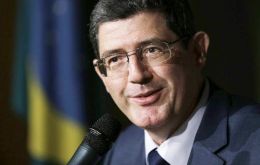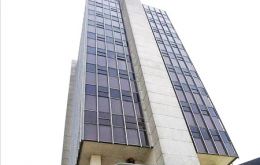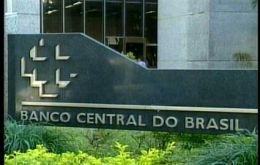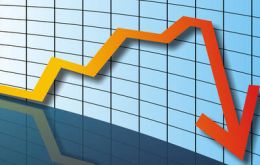MercoPress. South Atlantic News Agency
Tag: Brazil economy
-
Tuesday, January 20th 2015 - 05:48 UTC
Party is over in Brazil: increase in fuel, tax on consumer loans and imports

Brazil on Monday announced tax increases on fuel, imports and consumer loans aimed at raising 20.6 billion Reais (7.7bn dollars) in additional revenues this year. The plan is part of an effort to help balance budget accounts and revive investor confidence, Finance Minister Joaquim Levy said at a news conference.
-
Tuesday, January 6th 2015 - 07:32 UTC
Brazil' finance minister pledges fiscal balance and cuts in spending

Brazil must focus on making difficult fiscal adjustments in order to get economic growth and investment back in gear, the country's new Finance Minister Joaquim Levy said on Monday. At his swearing-in ceremony in Brasilia, Levy said the process will require the participation of society as a whole and will involve changes to taxes and spending, without resorting to accounting shortcuts.
-
Wednesday, December 17th 2014 - 13:19 UTC
Brazilian economy remains flat with similar forecast for 2015

Brazil's economy contracted 0.26% in October, ending a three-month growth streak and coming in below analysts' expectations of a 0.30% expansion, reported the Central Bank.
-
Monday, December 8th 2014 - 11:12 UTC
Dilma Rousseff after quick transition in Finance given the fiscal deterioration

Brazil's new economic team headed by Joaquim Levy is expected to take office sometime in the next few days after the ruling coalition of President Dilma Rousseff finally managed Congress to approve a loosening of this year's budget targets including the crucial primary budget.
-
Thursday, December 4th 2014 - 05:09 UTC
Rousseff promises JPMorgan investors a balanced budget and full support of Levy

President Dilma Rousseff said in a letter to investors that one of the main priorities of her second term will be to put Brazil's fiscal accounts in order, sending a strong message that her administration will adopt more market-friendly policies.
-
Wednesday, December 3rd 2014 - 08:06 UTC
Brazil posts in November its worst trade monthly result in 20 years

Brazil posted a 2.35 billion dollars trade deficit in November, the country's worst monthly result in 20 years, and cementing its slide into the red for the year after a decade of surpluses.
-
Wednesday, November 19th 2014 - 08:06 UTC
Brazil's economy growth forecast could have reached a positive inflection point

Private sector analysts raised their 2014 growth forecast for Brazil's economy to 0.21% from 0.20% last week, the Central Bank said on Monday. But analysts left their 2015 gross domestic product (GDP) growth estimate unchanged at 0.80%, the Central Bank said. However it is expected the latest forecast could mean the beginning of the end to the sustained several years slide and an inflection point.
-
Saturday, November 15th 2014 - 08:04 UTC
Stats bash Roussef: Brazil lost jobs in October for the first time since 1999

Brazil lost jobs in October for the first time in at least 15 years, revealing the delicate state of the economy ahead of potential tax hikes and government austerity. Labor Ministry data showed on Friday that Latin America's largest economy unexpectedly trimmed 30,283 net payroll jobs in the tenth month of the year, the worst reading for the month since the data series began in 1999.
-
Friday, November 14th 2014 - 06:38 UTC
Brazil's Rouseff re-election: lower expectations

By R. Viswanathan (*) - The reelection of President Dilma Rouseff means continuation of the slow growth of the Brazilian economy and a lower likelihood of much-needed, major political and economic reforms. India should lower its expectations on a global partnership with Brazil.
-
Tuesday, October 28th 2014 - 15:27 UTC
Brazilian economy remains in recession; Central bank survey indicates 0.27% growth this year

Private sector analysts are maintaining their 2014 growth forecast for Brazil's economy at 0.27%, the Central Bank said on Monday. GDP estimate was included in the Focus review, a weekly Central Bank survey of analysts from about 100 private financial institutions on the state of the national economy.
